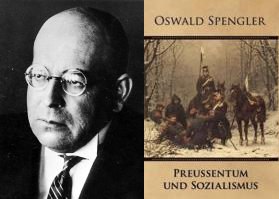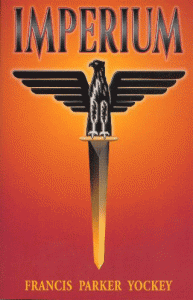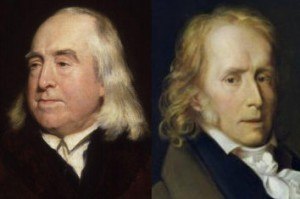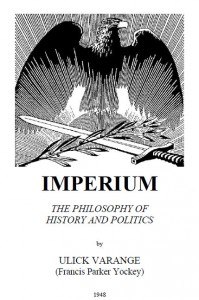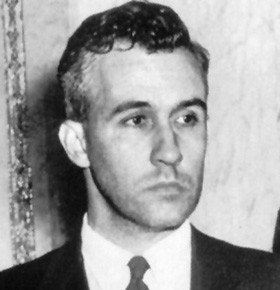Podcast: Play in new window | Download
Continuing with Imperium, The 20th Century Political Outlook, p215:
The idea of bringing in the law to make a given state of affairs sacrosanct was not original with Liberalism. Back in Hobbes’s day, other groups were trying it, but the incorruptible mind of Hobbes said with the most precise clarity that the rule of law means the rule of those who determine and administer the law,
216
that the rule of a “higher order” is an empty phrase, and is only given content by the concrete rule of given men and groups over a lower order.
This was political thinking, which is directed to the distribution and movement of power. It is also politics to expose the hypocrisy, immorality and cynicism of the usurer who loudly demands the rule of law, which means riches to him and poverty to millions of others, and all in the name of something higher, something with supra-human validity. When Authority resurges once more against the forces of Rationalism and Economics, it proceeds at once to show that the complex of transcendental ideals with which Liberalism equipped itself is as valid as the Legitimism of the era of Absolute Monarchy, and no more. The Monarchs were the strongest protagonists of Legitimism, the financiers of Liberalism. But the monarch was tied to the organism with his whole existence, he was responsible organically even where he was not responsible in fact. Thus Louis XVI and Charles I. Countless other monarchs and absolute rulers have had to flee because of their symbolic responsibility. But the financier has only power, no responsibility, not even symbolic, for, as often as not, his name is not generally known. History, Destiny, organic continuity, Fame, all exert their powerful influence on an absolute political ruler, and in addition his position places him entirely outside the sphere of base corruptibility. The financier, however, is private, anonymous, purely economic, irresponsible. In nothing can he be altruistic; his very existence is the apotheosis of egoism. He does not think of History, of Fame, of the furtherance of the life of the organism, of Destiny, and furthermore he is eminently corruptible by base means, as his ruling desire is for money and ever more money.
“The usurer” and “the financier” is best understood as jews, who do in fact care about the life of the jewish organism. George Soros is a contemporary example which comes immediately to mind. Names less generally known include Haim Saban and Sheldon Adelson.
The Execution of Louis XVI, 1793, king of France 1774-1793. Charles I of England, monarch of the three kingdoms of England, Scotland, and Ireland from 1625 until his execution in 1649.
In his contest against Authority the finance-Liberal evolved
217
a theory that power corrupts men. It is, however, vast anonymous wealth which corrupts, since there are no superpersonal restraints on it, such as bring the true statesman completely into the service of the political organism, and place him above corruption.
It was precisely in the fields of economics and law that the Liberal doctrine had the most destructive effects on the health of the Western Civilization. It did not matter much that esthetics became independent, for the only art-form in the West which still had a future, Western Music, paid no attention to theories and continued on its grand creative course to its end in Wagner and his epigones. Baudelaire is the great symbol of l’art pour l’art: sickness as beauty. Baudelaire is thus Liberalism in literature, disease as a principle of Life, crisis as health, morbidity as soul-life, disintegration as purpose. Man as individualist, an atom without connections, the Liberal ideal of personality. It was in fields of action rather than of thought that the injury was greatest.
Richard Wagner, German composer. Charles Baudelaire, French poet, member of the Decadent movement.
Allowing the initiative in economic and technical matters to rest with individuals, subject to little political control, resulted in the creation of a group of individuals whose personal wills were more important than the collective destiny of the organism and the millions of the population. The law which served this state of affairs was completely divorced from morality and honor. To disintegrate the organism from the spiritual side, what morality was recognized was divorced from metaphysics and religion, and related only to “society.” The criminal law reflected finance-Liberalism by punishing crimes of violence and passion, but not classifying such things as destroying national resources, throwing millions into want, or usury on a national scale.
The independence of the economic sphere was a tenet of
218
faith with Liberalism. This was not subject to discussion. There was even evolved an abstraction named “economic man,” whose actions could be predicted as though economics were a vacuum. Economic gain was his sole motive, greed alone spurred him on. The technic of success was to concentrate on one’s own gain and ignore everything else. This “economic man” was however man in general to the Liberals. He was the unit of their world-picture. “Humanity” was the sum total of these economic grains of sand.
III
The type of mind which believes in the essential “goodness” of human nature attained to Liberalism. But there is another political anthropology, one which recognizes that man is disharmonious, problematical, dual, dangerous. This is the general wisdom of mankind, and is reflected by the number of guards, fences, safes, locks, jails and policemen. Every catastrophe, fire, earthquake, volcanic eruption, flood, evokes looting. Even a police strike in an American city was the signal for looting of the shops by the respectable and good human beings.
Thus this type of thought starts from facts. This is political thinking in general, as opposed to mere thinking about politics, rationalizing. Even the wave of Rationalism did not submerge this kind of thinking. Political thinkers differ greatly in creativeness and depth, but they agree that facts are normative. The very word theory has been brought into disrepute by intellectuals and Liberals who use it to describe their pet view of how they would like things to be. Originally theory was explanation of facts. To an intellectual who is adrift in politics, a theory is an aim; to a true politician his theory is a boundary.
A political theory seeks to find from history the limits of the
219
politically possible. These limits cannot be found in the domain of Reason. The Age of Reason was born in bloodshed, and will pass out of vogue in more bloodshed. With its doctrine against war, politics, and violence, it presided over the greatest wars and revolutions in 5,000 years, and it ushered in the Age of Absolute Politics. With its gospel of the Brotherhood of Man, it carried on the largest-scale starvation, humiliation, torture and extermination in history against populations within the Western Civilization after the first two World Wars. By outlawing political thinking, and turning war into a moral-struggle instead of a power-struggle it flung the chivalry and honor of a millennium into the dust. The conclusion is compelling that Reason also became political when it entered politics, even though it used its own vocabulary. When Reason stripped territory from a conquered foe after a war, it called it “disannexation.” The document consolidating the new position was called a “Treaty,” even though it was dictated in the middle of a starvation-blockade. The defeated political enemy had to admit in the “Treaty” that he was “guilty” of the war, that he is morally unfit to have colonies, that his soldiers alone committed “war crimes.” But no matter how heavy the moral disguise, how consistent the ideological vocabulary, it is only politics, and the Age of Absolute Politics reverts once again to the type of political thinking which starts from facts, recognizes power and the will-to-power of men and higher organisms as facts, and finds any attempt to describe politics in terms of morals as grotesque as it would be to describe chemistry in terms of theology.
Yockey describes what he means by Absolute Politics earlier in Imperium: “We stand at the beginning of the Age of Absolute Politics, and one of its demands is naturally for powerful weapons. Therefore, technics is ordered to strain after absolute weapons.”
“The Brotherhood of Man” was part of the (jewish) zeitgeist by the late 1940s. the White network – Race and Fraud: The Races of Mankind – Part 4 discusses an anti-“racist” cartoon by that title, which was based on the fraudulent pseudoscientific war-era propaganda produced by Franz Boas’ disciples Ruth Benedict and Gene Weltfish.
There is a whole tradition of political thinking in the Western Culture, of which some of the leading representatives are Montaigne, Macchiavelli, Hobbes, Leibnitz, Bossuet, Fichte, de Maistre, Donoso Cortes, Hippolyte Taine, Hegel, Carlyle.
220
While Herbert Spencer was describing history as the “progress” from military-feudal to commercial-industrial organization, Carlyle was showing to England the Prussian spirit of Ethical Socialism, whose inner superiority would exert on the whole Western Civilization in the coming Political Age an equally fundamental transformation as had Capitalism in the Economic Age. This was creative political thinking, but was unfortunately not understood, and the resulting ignorance allowed distorting influences to fling England into two senseless World Wars from which it emerged with almost everything lost.
The contemporary view of Ethical socialism, as described by Wikipedia:
Ethical socialism is a political philosophy that appeals to socialism on ethical and moral grounds as opposed to economic, rationalist and materialist grounds.[1] It emphasizes the need for a morally conscious economy based upon the principles of service, cooperation, and social justice while opposing possessive individualism.[2] Therefore, in contrast to socialism inspired by rationalism, historical materialism, neoclassical economics and Marxist theory which base their appeals for socialism on grounds of economic efficiency, rationality or historical inevitability; ethical socialism focuses on the moral and ethical reasons for advocating socialism.
Ethical socialism is a form of liberal socialism closely related to Christian socialism, and had a profound impact on the social democratic movement and reformism during the later half of the 20th century, particularly in Great Britain.
Ethical socialism was advocated and promoted by former British Prime Minister Tony Blair
This cannot be the “Ethical Socialism” Yockey, the proud disciple of Spengler, had in mind. He referred instead to a distinction made by The Philosopher himself, in his essay “The Hour of Decision”, in 1933, which the synopsis at Amazon describes as:
An essay by the author of The Decline of the West, Oswald Spengler, on the need for “Prussianism” in order to save civilization from the “Coloured Peril,” based on Spengler’s view, just after the Naxi rise to power in 1933, that the white (European) tribes were under attack by colored races through a “war” by various political forces – enemies of the white race.
Oswald Spengler – Prussian Socialism, via The Traditionalist, is an excerpt in which Spengler contrasts the nationalist/moral form of socialism with the economic/internationalist/jewish form:
Throughout the world they think of Socialism not as a moral attitude of life but as economic Socialism, Labour Socialism, as a mass ideology with material aims. Program Socialism of every sort is thinking from below, building on base instincts, canonizing the herd-feeling which everywhere today lurks behind the slogan of “overcoming individualism”; it is the contrary of Prussian feeling, which has livingly experienced through exemplary leaders the necessity of disciplined devotion and possesses accordingly the inward freedom that comes with the fulfilment of duty, the ordering of oneself, command of oneself, for the sake of a great aim.
Labour-Socialism in every form, on the other hand, is, as I have already shown, definitely English in origin. It arose, about 1840, simultaneously with the victory of the joint-stock company and the rootless “financial” form of capital. Both were the expression of Free Trade Manchesterism: this “white” Bolshevism is capitalism from below, wage-capitalism, just as speculative finance-capital in respect of its method is Socialism from above, from the stock exchange.
Prussian is, lastly, a character which disciplines itself, such as that of Frederick the Great, which he himself paraphrased as consisting in being the First Servant of the State. … To be a servant of the State is an aristocratic virtue, of which few are possessed. If this is “Socialistic,” it is a proud and exclusive Socialism for men of race, for the elect of life. Prussianism is a very superior thing which sets itself against every sort of majority- and mob-rule; above all, against the dominance of the mass character. Moltke, the great educator of the German officer, the finest example of true Prussianism in the nineteenth century, was thus constituted. Count Schlieffen summed up his personality in the motto: “Talk little, do much, be, rather than seem.”
This idea of a “Prussian” existence will be the starting-point for the ultimate overthrowing of the World Revolution. There is no other possibility. I said, as far back as 1919: Not everyone is a Prussian who is born in Prussia; the type is possible anywhere in the white world and actually occurs, though rarely. […] The Prussian idea is opposed to finance-Liberalism as well as to Labour-Socialism. Every description of mass and majority, everything that is “Left,” it regards as suspect. […] All really great leaders in history go “Right,” however low the depths from which they have climbed. It is the mark of the born master and ruler.
What Spengler saw as Prussian – “aristocratic virtue, of which few are possessed” and “a proud and exclusive Socialism for men of race, for the elect of life” – are traits Ricardo Duchesne attributes to Aryans.

